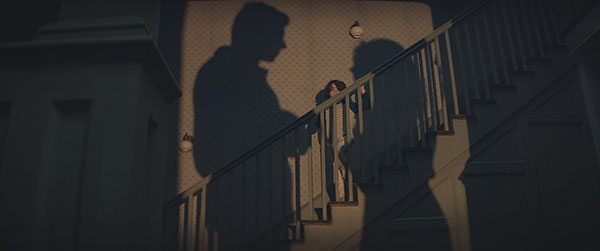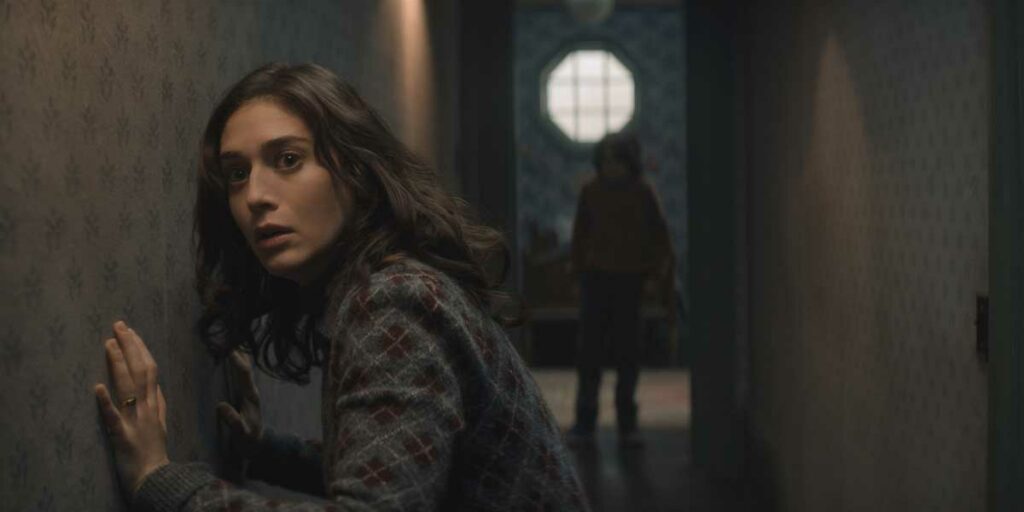Antony Starr and Lizzy Caplan’s strong performances are not enough to save the Stephen King-inspired Cobweb.
The horror genre has explored the mysteries and secrets parents keep from their kids in various ways. There have been body-horror constructions like Society and The Brood, as well as the psychological obstructions of Stoker and Resurrection. While these aforementioned films have a somewhat thematic similarity, that isn’t the only thing that connects them all. The directors attached to each film offer a unique approach to telling their stories. In his latest film, Cobweb, director Samuel Bodin takes a more Stephen King-inspired approach to tell this type of tale, which serves as its own demise.
Cobweb begins one week before Halloween. A melancholic piano score accompanies the journey of a young boy named Peter (Woody Norman). He seems down in the dumps, often having his head down and being by himself. Later, we learn he’s the outsider in his class, often bullied and pushed around. The film doesn’t take much time to develop the reason why this happens; it just occurs without much purpose because it doesn’t add much to his backstory. At least his mother, Carol (the great Lizzy Caplan), greets him with a smile and open arms, although he still acts as if something has been bothering him for quite a while. During the night, Peter hears a strange knocking sound from his wall, as if something (or someone) was behind it.
Those sounds shake him, and this wakes his mother and father, Mark (Anthony Starr), to discover what’s happening. When I first saw Anthony Starr in the film, I didn’t buy his character. His performance isn’t bad, but his demeanor and expressions are reminiscent of Homelander’s – his villainous persona in the hit superhero series The Boys. In that series, he plays a menacing threat that always hides under a mask to make people love him instead of being afraid. I knew something fishy was going on with his character. While he might sell the role of an antagonist-in-the-making, Starr doesn’t make you feel he’s a caring father, unlike Caplan, who manages to deliver a performance that makes the viewer believe in her hidden villainy and devoted motherhood.
As you’d expect, Mark and Carol believe the knocking sounds are part of their son’s imagination. “You have a great, big, and beautiful imagination… All of those scary things are just in your head,” Carol even tells him, and these words calm Peter down for a while. Right until he hears a voice from his wall. It seems to be a young girl trapped inside the walls; she needs Peter’s help to escape her confined area. The only reason why Peter accepts to help her is because she is his only friend, and the only person he can talk to. This leads him down a path he soon would like to forget, as things are not what they seem, and danger lurks around every corner – hidden behind every door.

One problem that arrives early in the film lies in the Stephen King-inspired tropes in the story’s development. Cobweb often calls to a couple of the horror novelist’s works, specifically those that tell stories about children and their connection with supernatural beings: ‘Pet Sematary’, ‘Doctor Sleep’, ‘The Long Walk’, amongst others. It feels like a short story he could have concocted back in the day and is now being adapted to the screen, like many of his writings. These callbacks aren’t a bad thing per se. But the big issue arrives when director Samuel Bodin wants to fill the film’s first two acts with these tropes instead of letting the film be its own thing. In doing so, he ditches distinctiveness in style and narrative for something we have seen before.
I had the same issue with Rob Savage’s adaptation of King’s short story ‘The Boogeyman’. However, in the case of the aforementioned film, it went to a more extreme extent. Bodin at least used them as a guide, while Savage literally copied and pasted the Stephen King manual of horror film adaptations. At least Cobweb has some salvageable moments during those first two acts, primarily because of the performances. If it weren’t for Lizzy Caplan and Anthony Starr, even though the latter somewhat feels miscast, this film would have come crashing down since its early moments. They are the saving grace of the film’s lead-up to the grand conclusion. I would have liked both of them to have had more to play with, and a more solid script. But they make the best of their few selected scenes, as the focus is on Woody Norman’s Peter.
Cobweb leaves its best and more tense scenes to the very end with a relatively solid third act, where Bodin lets the monster loose both literally and metaphorically. While the first two acts lack tension, the third one basks in it, making sure the audience is worried about what’s to come for young Peter. That tension, mixed with the great creature design, which looks like Samara from The Ring had spider-like qualities and walked up the walls, makes these last few scenes enjoyable. After almost an hour of being snooze-worthy, the film shows signs of life. It even gets gruesome on several occasions, with dismemberment and decapitations occurring, even though they happen off-screen due to the film being more teen-oriented. Still, it is nice of the director and crew not to shy away from a bloody brigade for the film’s curtain closer, even if it was slight.
The ending is quite bittersweet, as it doesn’t hint at a happy ending. The monster leaves Peter a message that will scar him forever and ever. While I enjoyed this darker ending, the bitter taste emerges due to its abruptness in the final confrontation and the need to over-explain itself. The best horror films have memorable and creative finishes that not only help to conclude their premise and uplift their respective themes but also remain in your head for years. Cobweb, unfortunately, doesn’t have one. It rushed its way onto the final bout for no particular reason. This takes the viewer out of the thrilling experience and doesn’t make them want to revisit the film afterward.
In relation to the film’s inclination to have the villain over-explain its reasonings, there was just no need. I don’t like that a movie, specifically a character, takes time to unnecessarily explain its thesis. For the entire runtime, nobody explained anything, leaving room for ambiguity. Yet, right when the film is nearing its end, the antagonist now wants to take time to explain how everything happened and the way it ties to the movie’s concepts. If you went that far without subtext, please don’t dump it on us in the finale. While there are sparks of dread and tension smeared across this third act, it is ruined by these decisions. It truly disappoints me that yet another exciting premise in a horror project is ruined by baffling closing decisions.
Cobweb will be released in US theaters on July 21, 2023.

